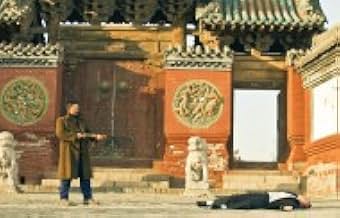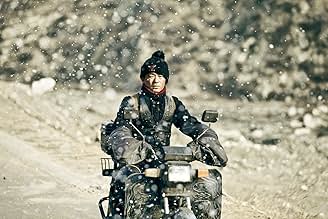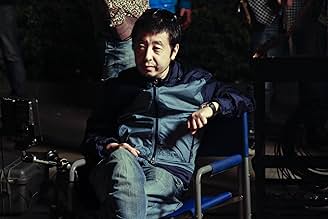AVALIAÇÃO DA IMDb
7,1/10
14 mil
SUA AVALIAÇÃO
Quatro histórias independentes ambientadas na China moderna sobre atos aleatórios de violência.Quatro histórias independentes ambientadas na China moderna sobre atos aleatórios de violência.Quatro histórias independentes ambientadas na China moderna sobre atos aleatórios de violência.
- Prêmios
- 18 vitórias e 12 indicações no total
Avaliações em destaque
after finally watching A Touch Of Sin this evening at ACMI with some friends, it's left me stuck in 2 worlds - missing Jia Zhang-Ke's meditative & lyrical work of the past & liking the new approach to these social wrongs in a more brutal / violent / cynical manner...
first thoughts were quite similar to when i watched another master film maker Kim Ki-Duk's "Pieta" which after further digestion, thought & reading became my fave film of 2013 - both films show violence in a heavy way but still portray it in a meditative & profound manner, using symbolic moments to remind the audience about these issues...
in hindsight i really like this film and where Jia is going with his approach... considering this is a narrative driven film over his powerful and thought provoking documentaries, all the killings were based on real events the director read in blogs... the film is a vessel to show these separate events as one about alienation, the varying classes in china & corruption / political flaws...
here's a good article from Slant which covers a lot of how i feel towards the films - 8/10
http://www.slantmagazine.com/film/review/a-touch-of-sin
first thoughts were quite similar to when i watched another master film maker Kim Ki-Duk's "Pieta" which after further digestion, thought & reading became my fave film of 2013 - both films show violence in a heavy way but still portray it in a meditative & profound manner, using symbolic moments to remind the audience about these issues...
in hindsight i really like this film and where Jia is going with his approach... considering this is a narrative driven film over his powerful and thought provoking documentaries, all the killings were based on real events the director read in blogs... the film is a vessel to show these separate events as one about alienation, the varying classes in china & corruption / political flaws...
here's a good article from Slant which covers a lot of how i feel towards the films - 8/10
http://www.slantmagazine.com/film/review/a-touch-of-sin
As always with portmanteau films, I found the quality of these four tales (or tellings) varies quite a lot, as does one's sympathy or empathy for the characters. As such, as others have commented, I thought that the rest of the film did not match up to the first quarter. However, the other three parts were not *bad*, and for me added to the overall tone of societal bleakness. I've made brief visits to China but would in no way say that qualifies me to judge how "realistic" a picture this is, despite the factual bases of the component stories. However, as we increasingly observe and debate the effect of China's actions on the wider global stage, this film perhaps provides helpful context, if this is the domestic backdrop...
The director has so much to express, which makes the film loose. He wants to show the whole picture of modern China by referencing lots of news in the stories. But it weakens the story itself. The fourth fragment is most representative. It seems not so reasonable.
A few actors are great, like Wu and Tao, while others do not their roles. Baoqiang is not ferocious enough as a professional robber. Some guest actors are unnecessary, even ruin this movie, such as Sanming.
Anyway, we should show respects to both Zhangke and this movie. He really wants to express his anxiety about this sick society. He reminds us this situation is unstable and unsustainable. We are on the edge of a crash.
A few actors are great, like Wu and Tao, while others do not their roles. Baoqiang is not ferocious enough as a professional robber. Some guest actors are unnecessary, even ruin this movie, such as Sanming.
Anyway, we should show respects to both Zhangke and this movie. He really wants to express his anxiety about this sick society. He reminds us this situation is unstable and unsustainable. We are on the edge of a crash.
This is a Chinese film written and directed by Jia Zhangke. There are four stories about four characters in modern China. They each face the corrupted modern world with violence. Jia based each story on a real event ripped from the headlines.
The most compelling one has to be Dahai. It's the performance of Wu Jiang. There is a real power in his presence. I would prefer the whole movie staying with him. It's not as simple as rooting for him. Quite frankly, it's hard to root for the guy after he shoots a kid. It reminds me of Michael Douglas in Falling Down. I had a hard time staying with the other stories. I kept waiting to reconnect with the Dahai story. I appreciate the idea of an anthology film. It's often the case that one stands out among the crowd. I always pine for more from one over the others.
The most compelling one has to be Dahai. It's the performance of Wu Jiang. There is a real power in his presence. I would prefer the whole movie staying with him. It's not as simple as rooting for him. Quite frankly, it's hard to root for the guy after he shoots a kid. It reminds me of Michael Douglas in Falling Down. I had a hard time staying with the other stories. I kept waiting to reconnect with the Dahai story. I appreciate the idea of an anthology film. It's often the case that one stands out among the crowd. I always pine for more from one over the others.
After some moments of silence, the master of the sixth generation of Chinese filmmakers, Jia Zhangke returns with his newest feature "A Touch of Sin" (2013) which might just be his darkest work to date. It's an intriguing film of sheer brilliance told through the complexity of several, loosely connected stories about people in agony. While some fans of the director may be disappointed by the lack of clairvoyant lyric beauty, characteristic for example for "Still Life" (2006), others may find the narrative ambiguity and incoherence rather enriching.
The film begins with an enigmatic scene at a deserted rural highway where a truck carrying tomatoes has fallen over. A cold sense of brutality breathes in the air. Soon the first characters are introduced and we learn that, in the same way as in "Still Life", "A Touch of Sin" is structured from different stories with different human fates. In brief, it tells the story of four random acts of violence in today's society.
Although the stories lack obvious connection, they all share a few essential elements. First of all, they all escalate to an outburst of violence. Second, all of them are tales of social rootlessness and existential alienation. The latter remark is congruous with the fact that in all of Zhangke's films the general aspect meets the particular in a poignant fashion of chill and solitude. Individuals live in their personal prisons while the modernization of the society brings nothing but empty freedom. In other words, they live in spaces that are both private and public where they feel utterly detached. No one belongs anywhere in the Zhangke universe.
Due to the complexity of several stories, the film also includes more than one central milieu. However, this seemingly arbitrary set of different settings of hotels and a coal miners' town do tell us about veritably similar subjects. All the spaces are haunted by the same problems. Such conflict of ambiguity and coherence should not frighten the spectator. Since instead of a straight-forward narrative with clear character delineation, Zhangke offers us a fascinatingly cynical cross-section of the contemporary Chinese society which is, on the one hand, characterized by economic boom to whose technological wonderland an individual may vanish, and, on the other, the tormenting but also comforting legacy of Mao.
Modern Chinese way of life appears to Zhangke as something diverse -- as something that is in a constant state of change. Like in his previous features, Zhangke once again focuses on the transforming reality, the current flow, and its consequences on the individuals. Although this was already done to an extent in "Still Life" through the complexity of two overlapping stories, it also cast hope in humanity, whereas "A Touch of Sin" is far more pessimistic.
Once again Zhangke's aesthetics of cinema is characterized by the elements of silence and emptiness in the images of loneliness and alienation. It is as though everything had died. Only violence is portrayed passionately, all the rest is understated. The violence in "A Touch of Sin" is raw and brutal, but essentially stripped. Above all, violence appears as a melancholic undertone of some kind which reveals the realities of the society.
Even if the opaque and complex narrative of "A Touch of Sin" left the viewer speechless and unable to describe what he or she had just seen, there is always something profound to admire in Zhangke's cinema. In his films there is always that certain mood which is quite difficult to be put in words. In brief, it is a mood of emptiness, but also of utter richness.
The film begins with an enigmatic scene at a deserted rural highway where a truck carrying tomatoes has fallen over. A cold sense of brutality breathes in the air. Soon the first characters are introduced and we learn that, in the same way as in "Still Life", "A Touch of Sin" is structured from different stories with different human fates. In brief, it tells the story of four random acts of violence in today's society.
Although the stories lack obvious connection, they all share a few essential elements. First of all, they all escalate to an outburst of violence. Second, all of them are tales of social rootlessness and existential alienation. The latter remark is congruous with the fact that in all of Zhangke's films the general aspect meets the particular in a poignant fashion of chill and solitude. Individuals live in their personal prisons while the modernization of the society brings nothing but empty freedom. In other words, they live in spaces that are both private and public where they feel utterly detached. No one belongs anywhere in the Zhangke universe.
Due to the complexity of several stories, the film also includes more than one central milieu. However, this seemingly arbitrary set of different settings of hotels and a coal miners' town do tell us about veritably similar subjects. All the spaces are haunted by the same problems. Such conflict of ambiguity and coherence should not frighten the spectator. Since instead of a straight-forward narrative with clear character delineation, Zhangke offers us a fascinatingly cynical cross-section of the contemporary Chinese society which is, on the one hand, characterized by economic boom to whose technological wonderland an individual may vanish, and, on the other, the tormenting but also comforting legacy of Mao.
Modern Chinese way of life appears to Zhangke as something diverse -- as something that is in a constant state of change. Like in his previous features, Zhangke once again focuses on the transforming reality, the current flow, and its consequences on the individuals. Although this was already done to an extent in "Still Life" through the complexity of two overlapping stories, it also cast hope in humanity, whereas "A Touch of Sin" is far more pessimistic.
Once again Zhangke's aesthetics of cinema is characterized by the elements of silence and emptiness in the images of loneliness and alienation. It is as though everything had died. Only violence is portrayed passionately, all the rest is understated. The violence in "A Touch of Sin" is raw and brutal, but essentially stripped. Above all, violence appears as a melancholic undertone of some kind which reveals the realities of the society.
Even if the opaque and complex narrative of "A Touch of Sin" left the viewer speechless and unable to describe what he or she had just seen, there is always something profound to admire in Zhangke's cinema. In his films there is always that certain mood which is quite difficult to be put in words. In brief, it is a mood of emptiness, but also of utter richness.
Você sabia?
- CuriosidadesJia Zhang-ke: in the third story as a patron of the brothel. He is shown walking down a hallway from behind talking on his cell phone and smoking a cigar. At the end of the shot he turns to survey the line of girls in the hallway.
- ConexõesFeatured in At the Movies: Episode #10.23 (2013)
Principais escolhas
Faça login para avaliar e ver a lista de recomendações personalizadas
- How long is A Touch of Sin?Fornecido pela Alexa
Detalhes
- Data de lançamento
- Países de origem
- Central de atendimento oficial
- Idiomas
- Também conhecido como
- A Touch of Sin
- Locações de filme
- Chongqing, China(San'er episode)
- Empresas de produção
- Consulte mais créditos da empresa na IMDbPro
Bilheteria
- Faturamento bruto nos EUA e Canadá
- US$ 154.120
- Fim de semana de estreia nos EUA e Canadá
- US$ 19.867
- 6 de out. de 2013
- Faturamento bruto mundial
- US$ 854.891
- Tempo de duração2 horas 10 minutos
- Cor
- Mixagem de som
- Proporção
- 2.35 : 1
Contribua para esta página
Sugerir uma alteração ou adicionar conteúdo ausente

Principal brecha
By what name was Um Toque de Pecado (2013) officially released in India in English?
Responda


























